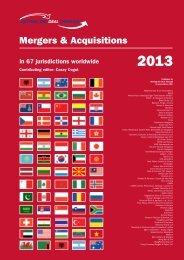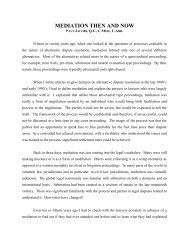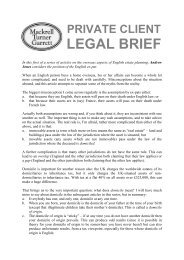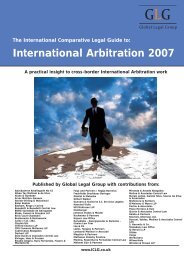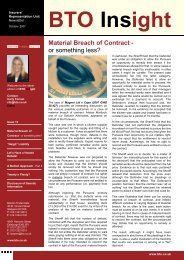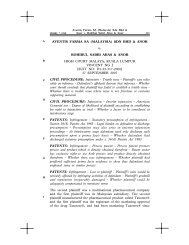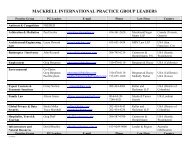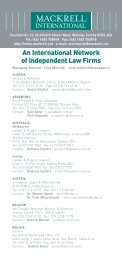Merger Control 2008 - Mackrell International
Merger Control 2008 - Mackrell International
Merger Control 2008 - Mackrell International
- No tags were found...
You also want an ePaper? Increase the reach of your titles
YUMPU automatically turns print PDFs into web optimized ePapers that Google loves.
Chapter 8AlgeriaAmine GhellalGhellal & MekerbaMahieddine Raoui44Introductory Remarks:The contributors would like to bring the reader’s attention to thefact that Algerian merger control is in its early stages and thatnumerous provisions of local competition regulation have not yetbeen interpreted. This situation is particularly well illustrated in thelack of clarity of the articles pertaining to the notification threshold.However, it is worth stressing that the principles underlyingAlgerian merger control mechanisms are directly inspired fromthose applicable within the European internal market. Theapproximation of Algerian regulation towards European regulationhas been formalised by an Algerian Declaration attached to theAssociation Agreement signed with the European Community andits Member States. The Declaration states that Algeria “shall beinspired by the orientations of European Union competition policywhen applying its own competition regulation”. As to theinterpretation of provisions other than that pertaining to thenotification threshold, such commitment is liable to ensure a certainlevel of predictability1 Relevant Authorities and Legislation1.1 Who is/are the relevant merger authority(ies)?According to Ordinance n°03-03 of 19 July 2003 (hereinafter “theOrdinance”), the “Conseil de la Concurrence” (hereinafter “theCouncil”) is empowered to control mergers. The Council canauthorise or reject a concentration after having solicited the opinionof the Minister of Commerce.When justified by reasons of general interest, the Government may,on its own initiative or on demand of one of the parties to themerger, override a rejection decision taken by the Council.In some specific sectors, other authorities may have their say in thecontrol of the merger (please refer to question 1.4).1.2 What is the merger legislation?<strong>Merger</strong> control is ruled by the Ordinance that amends Ordinancen°95-06 of 25 January 1996. Executive Decree n°05-219 of 22June 2005 sets the procedure governing the notification of aconcentration project (hereinafter “the Decree”).1.3 Is there any other relevant legislation for foreign mergers?Under domestic law, there is no specific provision applicable tomergers which exclusively involve foreign firms.From a financial standpoint, foreign investments are subject to thesame regime as that applicable to domestic ones. The said regimeflows from Ordinance n°01-03 of 10 August 2001, recentlyamended by Ordinance n°06-08 of 15 July 2006, which is mainlyintended to encourage investment in economic activities.1.4 Is there any other relevant legislation for mergers inparticular sectors?Yes. Some particular sectors are subject to specific verticalregulations. These provisions may enable authorities other than theCouncil to take part in the merger control process.The main fields in which specific legislation is inclined to have aneffect on the merger control process are the following:Electricity: Act n°02-01 of 6 February 2001 pertaining toelectricity and gas distributions provides in its Article 115,point 13, that, under certain circumstances, an acquisition ora takeover of electrical power undertakings shall be approvedby the Electricity and Gas Regulation Commission.Post and Telecommunication: According to Article 13,paragraph 1, of Act n°00-03 of 6 August 2000, the Post andTelecommunication Regulation Authority shall ensure theexistence of an effective competition on the post andtelecommunications market. This prerogative mayencompass the possibility for the said Authority to controlmergers which are liable to have an effect on competition.Banking: According to Article 94 of Ordinance n°03-11 of26 August 2003, all transfers of shares of banks and financialinstitutions shall be subject to the prior authorisation of theGovernor of the Bank of Algeria.Insurance: According to Article 228 bis of Ordinance n°95-07 dated on 25th January 2005.as amended by Law n°06-04dated 20thFebruary 2006, all transfer of shares of insurancecompanies exceeding 20% of the capital of the saidcompanies shall be subject to the prior authorisation of theCommission of Insurances Supervision (Commission desupervision des assurances).From a horizontal standpoint, one shall also bear in mind thatprivatisation operations, which are deemed mergers under theOrdinance, are to be authorised by the “Conseil des Participationsde l’Etat” by application of Article 9 of Ordinance n°01-04 of 20August 2001.It must be stressed that the coexistence between the rules set in theOrdinance and the above-mentioned specific rules is still unclear.The only relevant provision in this respect is Article 39 of theOrdinance which states that when a practice referred to the Counciloccurs within an industry which is under the control of a specificregulation authority, it must transmit a copy of the file to the saidWWW.ICLG.CO.UKICLG TO: MERGER CONTROL <strong>2008</strong>© Published and reproduced with kind permission by Global Legal Group Ltd, London
Ghellal & MekerbaAlgeriaauthority in order to obtain its opinion.Present legislation thus leaves room for interpretation and practicewill undoubtedly play a key role in defining the coexistencebetween the Ordinance and other specific regulation.2 Transactions Caught by <strong>Merger</strong> <strong>Control</strong>Legislation2.1 Which types of transaction are caught - in particular, howis the concept of “control” defined?<strong>Merger</strong> control is intended to cover all transactions that lead to alasting change in the structure of the party’s undertakings and thatconsequently have an effect on the structure of the market.The notion of a concentration adopted by Article 15 of theOrdinance is the same as that defined in the European Community<strong>Merger</strong> Regulation (hereinafter ECMR).A concentration shall be deemed to arise when:two or more previously independent undertakings merge; orone or more persons already holding control of at least oneundertaking, or one or more undertakings, acquire control ofall or part of one or more other undertakings, directly orindirectly, whether by the acquisition of a holding in thecapital or by purchasing assets, a contract or any other means.As well as concerning the notion of concentration, the notion ofcontrol is directly inspired from the ECMR.Indeed, control shall be constituted by rights, contracts or any othermeans which, either separately or in combination, and havingregard to the considerations of fact or law involved, confer thepossibility of exercising a decisive influence on an undertaking ona lasting basis. Such control shall notably take the shape of:the ownership or the right to use all or part of the assets of anundertaking; orrights or contracts which confer decisive influence on thecomposition, voting or decisions of the organs of anundertaking.2.2 Are joint ventures subject to merger control?Only “full-function” joint ventures, as defined for instance by EClaw, are subject to merger control.According to Article 15.3 of the Ordinance, the creation of a jointventure is subject to domestic merger control if the newly createdentity is intended to perform on a lasting basis all the functions ofan autonomous economic entity.There is no specific threshold applicable to joint ventures.Joint ventures other than “full-function” shall, in principle, bereviewed under rules pertaining to anti-competitive agreements setin Articles 7, 8 and 9 of the Ordinance.Such joint ventures may be notified to the Council and certified asnot being in breach of competition law. Certification will begranted within a document entitled “attestation négative” deliveredby the Council to the undertaking parties. The procedure to becomplied with in order to obtain the said certificate is set byExecutive Decree n°05-178, of 12 May 2005.Indeed, the threshold set in the Ordinance is grounded on the marketshares of the participating undertakings and not on their turnover, asis the case under EC law.According to Article 17 of the Ordinance, operations that are liableto hinder competition, notably by strengthening a dominant positionon a market, have to be notified to the Council.Article 18 of the Ordinance provides that Article 17 applies eachtime that operations are intended to exceed a 40% threshold of salesor purchases on a market.From a practical standpoint, it is to be stressed that the market sharethreshold raises important issues, since it implies that theundertaking parties must define the relevant market prior to thenotification of the operation to the Council.Moreover, as mentioned below, the interaction between Article 17and Article 18 of the Ordinance is, for the time being, unclear(please refer to question 3.1).2.4 Does merger control apply in the absence of a substantiveoverlap?In principle, merger control applies each time that a transaction isliable to hinder competition. As mentioned below, some importantissues are dependent on the interpretation of Article 18 (please referto question 3.1). The application of merger control to situationswhere there is no substantial overlap will depend on the saidinterpretation2.5 In what circumstances is it likely that transactionsbetween parties outside your jurisdiction (“foreign toforeign” transactions) would be caught by your mergercontrol legislation?No provision of merger control legislation pertains to the“nationality” of the parties. Therefore, as soon as they meet thecriteria set in the Ordinance, “foreign to foreign” transactions shallbe subject to the control of the Council. In such circumstances, acooperation mechanism may be needed to implement the Council’sdecision.For instance, a cooperation mechanism has been set up between theCouncil and the European Commission in order to control mergerscarried out within the European internal market which may have aneffect on the Algerian market (please refer to question 6.1).2.6 Please describe any mechanisms whereby the operation ofthe jurisdictional thresholds may be overridden by otherprovisions.There is no such mechanism under domestic law.2.7 Where a merger takes place in stages, what principles areapplied in order to identify whether the various stagesconstitute a single transaction or a series of transactions?<strong>Merger</strong>s taking place in stages are not subject to specific rules.Under the merger legislation the sole criterion that is taken intoconsideration in order to qualify a transaction is that of transfer ofcontrol.Algeria2.3 What are the jurisdictional thresholds for application ofmerger control?The jurisdictional threshold is one of the rare points in whichdomestic law clearly departs from EC regulation.ICLG TO: MERGER CONTROL <strong>2008</strong>© Published and reproduced with kind permission by Global Legal Group Ltd, LondonWWW.ICLG.CO.UK 45
Ghellal & MekerbaAlgeria3 Notification and its Impact on the TransactionTimetable3.5 At what stage in the transaction timetable can thenotification be filed?Algeria463.1 Where the jurisdictional thresholds are met, is notificationcompulsory and is there a deadline for notification?As mentioned above, the rules pertaining to the threshold controlare set by Articles 17 and 18 of the Ordinance (please refer toquestion 2.3). These two provisions have not yet been interpretedby the Council. They could be interpreted either narrowly orbroadly:Under the narrow interpretation, only operations which areintended to exceed 40% of sales or purchases on a marketwould have to be notified to the Council. Such aninterpretation does not seem entirely compatible with Article17 of the Ordinance to the extent that it only allows thecontrol of operations where dominant positions are at issue.According to the broad interpretation, operations intended toexceed 40% of sales or purchases on a market would have to,as is the case under the narrow interpretation, be notified tothe Council.In addition, however, all other operations that are liable tojeopardise competition would also have to be notified to theCouncil. This interpretation seems more in line with the substantivetest set by article 17 of the Ordinance as stated below (please referto question 4.1).One has to stress that, owing to the important practical issues thatboth of these interpretations are liable to raise (i.e. definition of therelevant market and assessment of the potential anti-competitiveeffects of the concentration by the undertakings parties prior thenotification to the Council), none may be deemed a panacea.There is no deadline for notification. However, the control must beexercised ex ante, and Article 20 of the Ordinance provides thatduring the period necessary for the Council to render its decision,the parties shall not adopt any measure that would make theoperation irremediable.3.2 Please describe any exceptions where, even though thejurisdictional thresholds are met, clearance is not required.There is no such exception under domestic law. However, as willbe explained hereinafter (please refer to question 5.1), theGovernment can, under certain circumstances, override a refusaldecision of the Council.3.3 Where a merger technically requires notification andclearance, what are the risks of not filing?According to Article 61 of the Ordinance, if the notificationobligation is not complied with, the Council is empowered toimpose a fine that could reach up to 7% of the turnover achieved inAlgeria during the previous financial year by each undertaking thatis a party to the concentration, or by the undertaking which theconcentration created.3.4 Is it possible to carve out local completion of a merger toavoid delaying global completion?No. As soon as the threshold set in the Ordinance is met, the mergeris to be notified to the Council. As mentioned above (please referto question 3.1), the parties to a transaction shall not adopt anymeasure that would make the operation irremediable before thedecision of the Council.As mentioned above (please refer to question 3.1), the transactionshall be notified to the Council before the signing of a definitiveagreement. However, the Ordinance does not specify precisely thestage at which the notification shall be made.3.6 What is the timeframe for scrutiny of the merger by themerger authority? What are the main stages in theregulatory process? Can the timeframe be suspended bythe authority?According to Article 17 of the Ordinance, the Council shall renderits decision within a three-month period. The different phases ofthe regulatory process have not been specified in the Ordinance.The Council is not empowered to suspend the timeframe.3.7 Is there any prohibition on completing the transactionbefore clearance is received or any compulsory waitingperiod has ended? What are the risks in completing beforeclearance is received?Yes. As mentioned above (please refer to question 3.1), the partiesto the transaction shall not adopt any measure that would make theoperation irremediable before the decision of the Council. Firmscompleting a transaction before having obtained a clearancedecision may be imposed a fine that can reach up to 7% of theturnover achieved in Algeria during the previous financial year byeach undertaking that is a party to the concentration, or by theundertaking which the concentration created.3.8 Where notification is required, is there a prescribedformat?Executive Decree n°05-219 of June 22, 2005 relates to the rulesgoverning the request for a merger clearance.According to the said Decree, a clearance must be requested in a filethat must be notified in French and reproduced in five copies. Thesaid file includes:a formal request of clearance of which a model is annexed tothe Decree;a form containing relevant information on the operation atstake. A model of the form is annexed to the Decree;evidence of the powers conferred to the individual orindividuals requiring the clearance;a certified copy of the statutes of the company or companiesrequiring the clearance;copies of the last three balance sheets which must all becertified. If the concerned company or companies haveexisted for less than three years, they must transmit copies ofthe last balance sheets; andif available, a legalised copy of the bylaws of the company“resulting from the merger”.If several companies jointly request the clearance, only one filemust be presented.The Decree has been published in the Official Journal of theDemocratic and Popular Algerian Republic n°43 of June 25, 2005, p.3.3.9 Is there a short form or accelerated procedure for anytypes of mergers?There is no “fast-track-like” procedure under domestic law.WWW.ICLG.CO.UKICLG TO: MERGER CONTROL <strong>2008</strong>© Published and reproduced with kind permission by Global Legal Group Ltd, London
Ghellal & MekerbaAlgeria3.10 Who is responsible for making the notification and arethere any filing fees?4.4 During the regulatory process, what provision is there forthe protection of commercially sensitive information?Under Article 4 of the Decree, a distinction is drawn between twosituations:when a concentration is to be achieved through a merger or ajoint venture, the operation shall jointly be notified by theparties; andwhen a concentration takes the shape of an acquisition, theoperation shall be notified by the enterprise that takes thecontrol of the target firm.There are no filing fees.The Council may, without being opposed to professional secrecy,access any document or information which it deems necessary. Theparties may however request the protection of sensitiveinformation. In this case, the information or document must benotified separately and the statement “professional secrecy” mustbe apposed on each page.5 The End of the Process: Remedies, Appealsand EnforcementAlgeria4 Substantive Assessment of the <strong>Merger</strong> andOutcome of the Process4.1 What is the substantive test against which a merger willbe assessed?The test provided by the Ordinance is quite similar to the SIEC testused under ECMR, and the SLC test used under US legislation.Indeed, in order to anticipate the problems and limits raised by theuse of the “Dominance Test”, the Ordinance provides that theCouncil is empowered to control all mergers that are liable tojeopardise competition by notably strengthening a dominantposition of an undertaking in a market. A dominant position is notthe exclusive criterion upon which the assessment of the Councilshall be grounded.The Test used under Algerian legislation seems thereforesufficiently wide to allow the Council to deal with issues flowingfrom horizontal, vertical and conglomerate mergers. It also allowsfor the assessment of collective dominance and unilateral effects onoligopolistic markets. However, a strict interpretation of the rulespertaining to the notification threshold could limit thesepossibilities, especially concerning vertical mergers.4.2 What is the scope for the involvement of third parties (orcomplainants) in the regulatory scrutiny process?There are no specific rules pertaining to the involvement of thirdparties in the regulatory scrutiny process. However, given the wideinquiry powers of the Council, their intervention shall not beprecluded.5.1 How does the regulatory process end?At the end of the regulatory process, the Council shall adopt eithera clearance or a refusal decision. However, it is to be stressed thatthe Government may, upon request or on its own initiative, overridethe Council’s refusal for the sake of general interest.5.2 Where competition problems are identified, is it possible tonegotiate “remedies” which are acceptable to the parties?Clearance decisions may be subject to conditions that are intendedto attenuate the anti-competitive effects of the concentration atissue. The parties to the concentration may also, on their owninitiative, commit themselves to implementing measures aimed atremedying the anti-competitive effects of the concentration.Structural as well as behavioural remedies are acceptable. Onceadopted, remedies are compulsory.5.3 At what stage in the process can the negotiation ofremedies be commenced?In the notification file, the parties to the transaction are required tospecify the measures intended to remedy the anti-competitiveeffects of the concentration5.4 If a divestment remedy is required, does the mergerauthority have a standard approach to the terms andconditions to be applied to the divestment?This matter has not yet been dealt with under domestic law.4.3 What information gathering powers does the regulatorenjoy in relation to the scrutiny of a merger?5.5 Can the parties complete the merger before the remedieshave been complied?According to Article 8 of the Decree, the Council can require thefirms involved in the transaction to communicate all documents andinformation which it deems necessary.The Council can decide, after having received the report of itsauditor, to impose a fine which may not exceed DZD 500,000 (i.e.approximately US$ 6,500) on undertakings which deliberately, orby negligence, have provided an incorrect or incomplete version ofthe information that has been requested on the basis of Article 51.The same fine will be imposed on companies that did not supply theinformation within the timeframe that was granted to them by theauditor.The Council can also decide to impose a DZD 50,000 (i.e.approximately US$ 650) penalty per day of delay.ICLG TO: MERGER CONTROL <strong>2008</strong>© Published and reproduced with kind permission by Global Legal Group Ltd, LondonThis matter has not yet been dealt with under domestic law.5.6 How are any negotiated remedies enforced?Enforcement of negotiated remedies is not ruled in a detailed way.There is no rule specifying when, how and by whom compliancewith remedies is to be controlled.However, there is no doubt as to the compulsory nature of remedies.According to Article 62 of the Ordinance, in the case of noncompliancewith remedies or commitments, the Council isempowered to impose fines that can reach up to 5% of the turnoverachieved in Algeria in the previous financial year by eachundertaking party to the concentration, or by the undertaking towhich the concentration gave birth.WWW.ICLG.CO.UK 47
Ghellal & MekerbaAlgeriaAlgeria5.7 Will a clearance decision cover ancillary restrictions?Domestic merger control legislation does not provide any specificprovision on this issue and it has not yet been dealt with by theCouncil. However, one can reasonably assume that restrictionsnecessary to push the concentration forward are covered byclearance decisions.5.8 Can a decision on merger clearance be appealed?5.9 Is there a time limit for enforcement of merger controllegislation?Yes. According to Article 44 paragraph 4 of the Ordinance, factsdating back more than three years may not be referred to theCouncil if no attempt has been made to investigate, establish orpunish them.6 MiscellaneousOn the one hand, the Ordinance only explicitly deals with thepossibility of appealing a Council’s “refusal” decision. Accordingto its Article 19, paragraph 1, such a decision may indeed be theobject of an appeal before the “Conseil d’Etat”, which is the highestadministrative jurisdiction in the country.On the other hand, the possibility of appealing a “clearance”decision of the Council has not been provided for by the Ordinance.However, common administrative rules allow one to seek theannulment of an administrative decision. By virtue of these generalrules, it should be possible for third parties to a merger to lodge anaction against a clearance decision. This possibility is subject tocompliance with the following conditions:the applicant has to demonstrate that it has an interest inchallenging the clearance decision; andthe action is to be preceded by an out-of-court administrativesettlement procedure.The action seeking the annulment of the clearance decision of theCouncil shall be lodged before the “Conseil d’Etat” by applicationof Article 9.1 of Law n°98-01 of 30 May 1998.6.1 To what extent does the merger authority in yourjurisdiction liaise with those in other jurisdictions?Under the condition of reciprocity, the Council may, on its owninitiative or upon request, transfer to foreign competition authoritiesinformation gathered within its jurisdiction. It has to comply withprofessional secrecy.Furthermore, in order to facilitate the fulfilment of the free tradearea between Algeria and the European Union, Article 41 of theAssociation Agreement, which entered into force 1st September2005, and its Appendix 5, provide for a cooperation mechanismbetween the Council and the European Commission.6.2 Please identify the date as at which your answers are upto date.September 22, 2007.48WWW.ICLG.CO.UKICLG TO: MERGER CONTROL <strong>2008</strong>© Published and reproduced with kind permission by Global Legal Group Ltd, London
Ghellal & MekerbaAlgeriaAmine GhellalGhellal & MekerbaChemin Guérouard, El Mouradia16000 AlgerAlgeriaMahieddine RaouiGhellal & MekerbaChemin Guérouard, El Mouradia16000 AlgerAlgeriaTel: +213 21 60 31 75 / 08 13Fax: +213 21 60 08 12 / 02 69Email: amine.ghellal@ghellal.comDr. Ghellal, the founding partner of Ghellal & Mekerba, has 35 yearsof experience. He has a strong practice in matters pertaining tocompetition law, specifically as applied to the energy field.Dr. Ghellal’s practice also includes law relating to investment andinternational commerce, project finance, banking law, exchangecontrol regulation, tax and customs law, telecommunications, jointventures, mergers and acquisitions, and international commercialarbitration. He is an advocate at the Supreme Court and at the StateCouncil of Algeria and an experienced Arbitrator (ICC and ad-hoc).Dr. Ghellal is a graduate in both law and political science. Heobtained his PhD in France, with Summa cum laude and praises ofthe examination board. He also taught public law, both in Franceand Algeria, for many years, and has published many articles.Dr. Ghellal is a member of the Algerian Bar Association, a memberof the <strong>International</strong> Bar Association, a member of the ArbitrationInstitute (IAI), a correspondent of the World Bank in Algeria, anhonoured Member of the <strong>International</strong> Who’s Who of Professionals,a member of the <strong>International</strong> Lawyers Club (Head Office in France),and a member of the <strong>International</strong> Lawyers Association “<strong>Mackrell</strong><strong>International</strong>” (Head Office in Great Britain).Tel: +213 21 69 16 49Fax: +213 21 69 14 87Email: mahieddine.raoui@ghellal.comMahieddine Raoui specialises in Algerian and European competitionlaw, State aides and public business law. He worked for the M&Adepartment of a major European Bank and interned in the legaldepartment of the Council of the European Union before joining thelaw offices of Ghellal & Mekerba. He also worked as a consultantfor a company specialised in Euro-Mediterranean relationships.Mahieddine Raoui obtained a Master’s degree in Public BusinessLaw (cum laude) from the University Paris II and a Master’s degreein European Business Law (cum laude) from the University Paris V,after which he successfully passed the Parisian Bar Exam. He alsojoined the College of Europe where he obtained a Master’s degree inEuropean Advanced Interdisciplinary Studies (Magna Cum Laude).In 2005, Mahieddine participated in the prestigious “European LawMoot Court” competition and was awarded the “Best GeneralAdvocate” title by the members of the European Court of Justice andthe Tribunal of First Instance of the European Communities.Mahieddine is fluent in French and English.Mahieddine is currently on leave at Harvard Law School until May<strong>2008</strong>.AlgeriaOver the last two decades, Ghellal & Mekerba has been the trusted legal advisor of most prominent foreign and nationalcorporations operating in Algeria. Ghellal & Mekerba’s constant efforts to achieve outstanding performance haveallowed it to substantiate its status as Algeria’s leading law firm (Martindale Hubbell, Legal 500, Practical Law…).Ghellal & Mekerba’s team is truly international and comprises Algerian, European and American members. Its fifteendedicated attorneys, some of whom have more than thirty years of experience, provide the know-how needed to guidetheir clients towards the complete success of a business venture.Several of the firm’s attorneys have significant corporate experience at high-level posts. This particular feature hasallowed Ghellal & Mekerba to build an extensive professional network and has ensured its thorough understanding ofthe Algerian and North African business environment.All the firm’s lawyers are at least bilingual and work in French, Arabic, English, Spanish or German.The firm’s key practice areas include but are not limited to: hydrocarbon and mining law, investment and privatisationlaw, corporate law, commercial law, telecommunications law, national and European antitrust law, intellectual propertylaw; construction law, project finance and PPP, corporate finance, and international commercial arbitration.ICLG TO: MERGER CONTROL <strong>2008</strong>© Published and reproduced with kind permission by Global Legal Group Ltd, LondonWWW.ICLG.CO.UK 49





